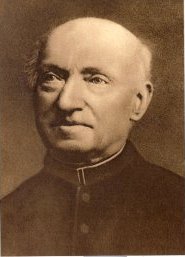Johann Evangelist Wagner

Johann Evangelist Wagner (born December 5, 1807 in Dattenhausen near Dillingen , † October 10, 1886 in Dillingen on the Danube ) was a German Roman Catholic clergyman, Regens of the seminary in Dillingen and founder of the Regens Wagner Foundation .
Life
Johann Evangelist Wagner was the sixth of eight children of the farmer Johann Evangelist Wagner and his second wife Kreszenz, née Waldenmayer. After studying theology at the University of Munich , he continued his studies at the Dillingen University from 1830 and was ordained a priest on May 31, 1833 .
In 1842 Wagner received a professorship for dogmatics at the University of Dillingen , the following year he became the spiritual director of the women's convent and confessor of the Dillingen Franciscan Sisters . On July 22nd, 1863 Johann Evangelist Wagner was appointed Regens (head) of the seminary in Dillingen.
In 1847, together with the superior of the Dillinger Franciscan Sisters , Sr. Maria Theresia Haselmayr , he founded the so-called deaf- and - dumb institution in Dillingen , a training and living facility for deaf girls and women, from which today's Regens-Wagner Foundations arose. Until his death in 1886, Wagner founded six more facilities for people with disabilities in the dioceses of Augsburg , Eichstätt and Bamberg : in Dillingen (1847), Glött (1869), Zell (1872), Hohenwart (1878), Lauterhofen (1881) , Holnstein (1881) and Michelfeld (1885).
His successors Magnus Niedermair , Wilhelm Hummel, Hans Frieß and Hans Appel founded another seven institutions throughout Bavaria and one in Hungary.
family
His younger brother was Joseph Johann Wagner , a farmer and member of the Reichstag for the Liberal Reich Party .
Awards
- 1857 Appointment to the Episcopal Spiritual Council
- 1878 Knight's Cross of St. Michael 1st Class , awarded by King Ludwig II.
- 1883 Cross of Honor of the Order of Ludwig
Admirable - Beatification Process
On March 19, 2001, the beatification process for Johann Evangelist Wagner was opened by the then Bishop Viktor Josef Dammertz .
Research and documentation of the data and facts about the life and work of Wagner followed. The results of this research as well as the documents for the verification of a wonderful healing were handed over to the responsible Vatican authorities in the final session of the procedure on May 3rd, 2004.
The congress of theologians decided unanimously that Regens Wagner had exercised all virtues in a heroic manner and had a reputation for holiness. Pope Benedict XVI on April 3, 2009 confirmed the heroic degree of virtue of Regens Wagner. The positive conclusion of this virtue process is the prerequisite for a beatification.
The Roman Medical Commission, however, closed two miracle trials negatively (November 2009, October 2011), since in their opinion the healings were due to a medical performance and not to a prayer hearing, which means that the positive outcome of the beatification process is still open.
literature
- Peter Rummel : Johann Evangelist Wagner. A life for others. Don Bosco Verlag, Munich 2010, ISBN 978-3-7698-1820-8 .
- Karl Pörnbacher: Regens Johann Evangelist Wagner. Pastor and advocate for people with disabilities. Ed .: Directorate of the Regens Wagner Foundations. Kunstverlag Josef Fink, Lindenberg 2002.
- Regens-Wagner-Stiftung Dillingen (Ed.): Regens Wagner and his work. Anton H. Konrad, Weißenhorn 1986.
- Manfred Berger : Johann Evangelist Wagner. In: Biographisch-Bibliographisches Kirchenlexikon (BBKL). Volume 20, Bautz, Nordhausen 2002, ISBN 3-88309-091-3 , Sp. 1509-1516.
- Christoph Goldt : Blessed and holy speaking procedure. Regens Johann Evangelist Wagner, 1807–1886 (= Church in a nutshell, Volume 1). Episcopal Press Office Augsburg, Augsburg 2003.
Web links
Individual evidence
- ^ Helmut Steinsdorfer: Die Liberale Reichspartei (LRP) from 1871 . Steiner, Stuttgart 2000, ISBN 3-515-07566-6 , p. 470.
| personal data | |
|---|---|
| SURNAME | Wagner, Johann Evangelist |
| BRIEF DESCRIPTION | German Roman Catholic clergyman |
| DATE OF BIRTH | December 5, 1807 |
| PLACE OF BIRTH | Dattenhausen near Dillingen |
| DATE OF DEATH | October 10, 1886 |
| Place of death | Dillingen on the Danube |
